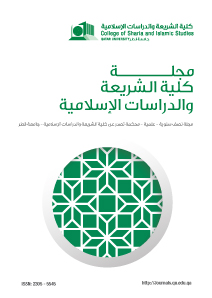تدريس النصوص الإسلامية العتيقة في إطار حديث: الصراع داخل الصف
الملخص
لقد صار من المعتاد بعد حوادث الحادي عشر من سبتمبر 2001 أن يفترض الكثيرون
وجود علاقة وطيدة بين التطرف ودراسة النصوص الإسلامية العتيقة. حاولنا في هذا
البحث أن نختبر بصورة عملية صحة هذا الافتراض. كان غرضنا من الاختبار أن ندرس
ما عسى أن يوجد من تأثير لبعض النصوص الإسلامية على سلوك الطلاب المسلمين.
وتحقيق ا لهذا الغرض قام الباحث )وهو أستاذ في الاسلاميات( باختيار "عينة" من
الطلاب الأمريكيين الذين سجلوا معه لدراسة الماجستير في الدراسات الإسلامية )بلغ
عددهم اثنا عشر طالب ا (. عرضت على كل منهم ثلاثة نصوص من التراث الاسلامي،
وطلب منهم أن يقوموا، كل على حده، بقراءة متأنية لتلك النصوص وكتابة تعليق عليها
يتضمن انطباعاته الشخصية وانتقاداته. كانت النتيجة غير المتوقعة أن 60 % من تلك
المجموعة لم يتأثر كثيرا بما قرأ؛ أما من تأثر بها )وهم 40 %( فقد كانت لهم معارف سابقة
وتجارب تعليمية تبلورت جميعها في إطار النظام التعليمي الغربي الحديث وتقاليد الغرب
الفكرية. وبناء على هذا يمكن القول إن النقد الموجه للنصوص الإسلامية العتيقة نقد في
غير مكانه، لأن أي نص يمكن أن يكون مؤثرا أو غير مؤثر بحسب المنهج المتبع في
التدريس، وبحسب البيئة التعليمية والفكرية التي يتشكل في داخلها المتعلم. فاذا كان لابد
من نقد فيجب ان يوجه للبيئة الأوسع؛ خاصة البيئة السياسية والفكرية، فهما يمثلا المناخ
الذي تقتل فيه بعض النصوص ويبتعث بعضها من الموت.
المقاييس
##plugins.themes.bootstrap3.article.details##
النصوص العتيقةالتطرفالمدارس الدينيةاستراتيجية القراءة
• Baqir Salman al-Najjar, 2003. Sira’ al-Ta’lim wa al-Mujtama’ fi al-Khalij al-Arabi (the Struggle of Education and Society in the Arab Gulf). Beirut: Dar al-Saqi
• Blake, J. Herman, and Saufley, Ronald W. 1979. “A Case Study in Faculty Development.” In Individualizing the System: Current Issues in Higher Education, edited by Vermilye, Dyckman W. San Francisco, Jossey-Bass publishers.
• Brill, Stephen. 2011. Class Warfare: Inside the Fight to Fix American’s Schools. New York: Simon & Schuster.
• Castillo, Daniel Del. 2001. “A Special Report from Afghanistan.” In The Chronicle of Higher Education.
• Coll, Steve. 2004. “Islamist Networks: The Afghan-Pakistan Connection.” Book Review, The Washington Post.
• Dijk, Teun A. Van & Kintsch, Walter.1983, Strategies of Discourse Comprehension. Orlando, Florida: Academic Press.
• Doumato, Eleanor Abdella.2003. “Manning The Barricades: Islam According to Saudi Arabia’s School Texts.” In The Middle East Journal, Vol. 57, No.2.
• Graesser, Arthur C and Clark, Leslie F. 1985. “Structures and Procedures of Implicit Knowledge.” Norwood, New Jersey.
• Hanvey, R. “Cross-Cultural Awareness.” In Smith, E. C. and Luce. L. F. (eds.). 1979. Towards Internationalism: Readings in Cross-Cultural Communication, Rowley, MA: Newbury House.
• Abbas Ihsan, ed., 1987. Rasa’il ibn Hazm al-Andalusi, (in Arabic), Vol.1-4. Beirut: al-Muasasah al-arabiyya lil dirasat wa al-Nashr
• Jackson, Holbrook. 2001. The Reading of Books. Illinois, University of Illinois Press.
• Kate, Allan S.1993. (Book Review). Language and Society, Vol.22, No.4, Cambridge University Press.
• Magomeddadaev, Amirkhan. 2003. “Politicization of Islam in Daghestan: The Factors Behind It.” In Central Asia and The Caucasus, Journal of Social and Political Studies, vol.3.No 21.Sweden.)
• Malkawi, Fathi. 2003. “The Future of Muslim Education in the United States: An Agenda for Research.” In American Journal of Islamic Social sciences, Vol.20. No.3 & 4.
• Mestenhuser, Josef A. 1988. “Concepts and Theories of Cultural Learning.” In Culture, Learning and the Disciplines, edited by Josef A. Mestenhauser. Washington: National Association for Foreign Students Affairs.
• Moeller, Aleidine J. 1994. “Content-Based Foreign Language Instruction in the Middle School: An Experiential Learning Approach.” In Foreign Language Annals, Vol. 27, No. 4, Winter.
• Rahman, Fazlur. 1979. Islam. Chicago, University of Chicago Press.
• Shamma, Ferida. 1999. “The Curriculum Challenge for Islamic Schools in America.” In Haque, Amber, ed., Muslims and Islamization in North America: Problems and Prospects. Beltsville, Maryland: Amana Publications.
• Singer, Harry and Donlan, Dan. 1989. Reading and Learning from Text. New Jersey, Lawrence Erlbaum Associates Publishers.
• Tocqueville, Alex De, 1983. The Old Regime and the French Revolution, Trans. By Stuart Gilbert. New York, Anchor Books, Doubleday.
• U.S. 9/11 Commission Report: Final Report of the National Committee on Terrorists Attack Upon the United States. 2004. New York: W.W. Norton & Company.
• West, Michael and Donato, Richard. 1995. “Stories and Stances: Cross-Cultural Encounters With African Folktales.” In Foreign Language Annals, Vol.28, No.3.
• Williams, Bryon Mac. 2002. “In Russia, A Small Islamic University Is a Large Political Thorn.” In The Chronicle of Higher Education, March 15.
• Williams, John Alden. 1961. Islam. New York: George Braziller.
• Zaid, Walid. 2004 June 18. “How the Holy Warriors Learned to Hate.” In The New York Times, (Op-Ed).


